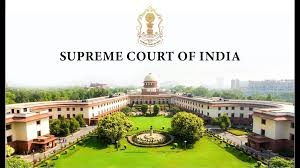By Anwarulhaq Baig
NEW DELHI—Several Islamic organizations and community scholars have expressed their strong dissent to the Supreme Court ruling that gave divorced Muslim women the right to claim lifelong maintenance from their ex-husbands under Section 125 of CrPC.
The ruling is in direct contravention to the provisions of the Muslim Personal Laws like the Shariat Application Act of 1937 and the Muslim Women (Protection of Rights on Divorce) Act, of 1986.
The judgment was given by a bench comprising Justices B.V. Nagarathna and Augustine George Masih on a petition filed by one Mohd. Abdul Samad of Hyderabad against a Telangana High Court order directing him to pay interim maintenance to his divorced wife.
Several Muslim organizations and individuals are considering the legal option to challenge the ruling before a higher top court bench.
Stating that the Supreme Court’s decision to give lifelong alimony to divorced Muslim women is against Sharia laws, All India Muslim Personal Law Board (AIMPLB) spokesperson Dr. SQR Ilyas said that Muslims in India are governed by the Shariat Application Act, which is based on Sharia or Islamic laws, similar to how the Hindu Code governs Hindus.
As Article 25 of the Constitution guarantees freedom of religion, Dr. Ilyas suggested that the courts must abstain from applying CrPC in cases where it (CrPC) clashes with Islamic or Sharia laws.
He said that the board’s legal committee was studying the judgment and based on its advice, the board might seek legal options to challenge the apex court’s verdict.
AIMPLB president Maulana Khalid Saifullah Rahmani said that similar decisions had been delivered by the court in the past as well. He said a team of scholars and lawyers were studying the judgment to challenge it before a suitable bench of the Supreme Court.
All India Muslim Majlis-e Mushawarat (Registered) president Dr. Zafarul-Islam Khan, who is a former Chairman of the Delhi Minorities Commission, labeled the Supreme Court’s judgment as “wrong” and “illegal”. He drew parallels with the Shah Bano case of 1985 which was overturned by a law passed by the then Rajiv Gandhi government.
Dr. Khan emphasized, “Muslim personal laws are legally protected in India through the Shariat Application Act, 1937, and this particular issue is protected by the Muslim Women (Protection of Rights on Divorce) Act, 1986. Until these two laws are repealed by Parliament, no judge has the right to give such judgments.”
Jamiat Ulama-e-Hind president Maulana Syed Arshad Madani said his organization would take appropriate action based on the advice of his legal committee that was engaged in studying the verdict.
Jamaat-e-Islami Hind’s Sharia Council secretary Dr. Raziul Islam Nadvi described the ruling as an apparent interference in Muslim personal law.
Pointing out that the Shariat Application Act of 1937 gave Muslims the freedom to act according to their personal laws in matters of marriage, divorce, inheritance, and other related issues, he advised that this legal framework should be respected and maintained.
Dr. Nadvi said the court decision will hurt women’s rights. “This decision is not in favour of women. If a husband knows he will have to provide lifelong maintenance, he might not give divorce and instead continue to oppress his wife within the marriage.” This, he suggested, could lead to prolonged suffering for women in unhappy or abusive marriages.
When questioned about situations where a divorced woman lacks family support, Dr. Nadvi advocated for collective societal responsibility rather than placing the entire burden on the ex-husband. He argued that imposing lifelong maintenance on an ex-husband is unjust and potentially damaging to the dignity of women who have chosen to end their marital relationships.
Dr. Nadvi noted, “In Islam, marriage is a contract between two persons, contrary to other religions, notably Hinduism, which regards marriage as a lifelong relation, calling it ‘Janam janam ka sath’ (a bond for a lifetime).” He questioned why, if the contract is dissolved through divorce, the ex-husband should continue to bear financial responsibility for his former wife. He posed a question: “Is there any other matter in the world where liabilities remain even after an agreement between two parties has ended? When this doesn’t happen in any other matter in the world, why should a husband be responsible for his ex-wife’s maintenance after the marriage contract has ended?”
He called for an end to interference in Muslim personal law through court, demanding, that “the door to interference in Muslim personal law should now be completely closed.”
Indian National League president Mohammad Sulaiman, reacting to the judgment, said the apex court’s decision to pay maintenance to a divorced wife was an “unnatural approach.” The judgment, he said, meant that the relationship had not ended if the former husband had to pay maintenance to his divorced wife.





